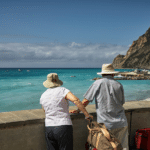Kazakhstan’s President Kassym-Jomart Tokayev knew in June that he needed to reinforce his country’s security and trade relationships. So in retrospect, his diplomatic offensive starting then, aimed at Asia, Europe, and North America, was a foresighted preparation for a tectonic geopolitical shift.
Diversifying International Relations
Of all the Central Asian states, Kazakhstan has been the most reliant on Russia for its sovereignty and economic livelihood. Russians settled in the north, center, and east of Kazakhstan in three waves from the eighteenth through the twentieth centuries. More recently, Russian media pundits, reflecting the elite political culture in Moscow as well as public opinion, have questioned Kazakhstan’s statehood and territorial integrity.
In June, at a public forum in St. Petersburg, President Tokayev tactfully avoided taking sides in the Russia-Ukraine conflict by declaring that Kazakhstan does not recognize the “quasi-state territories which, in our view, is what Luhansk and Donetsk are”. In response, Russia periodically cut off Kazakhstan’s access to its oil-export route to the Black Sea, first citing spurious “technical” reasons, and then using a judicial pretext.
With the Ukraine conflict raging onwards with no end in sight, Russia’s willingness and capability to respond to security threats to Central Asian states has greatly diminished. As the nature of international politics abhors a great-power vacuum, China could naturally step in. Thus its president, Xi Jinping, on a mid-September state visit in Astana, declared his resolute “support [for] Kazakhstan in defense of its independence, sovereignty, and territorial integrity”.
Tokayev is further diversifying his country’s diplomatic relationships by also bolstering ties with Turkey and the EU. At a recent meeting in Ankara, Turkish President Erdogan said, “We will continue to support the stability, peace, sovereignty, and territorial integrity of brotherly Kazakhstan”. Further to the West, Charles Michel, President of the European Council, met Tokayev in Astana on 26 October “to deepen ties with Central Asia and support intra-regional cooperation”.
Providing Security Guarantees
Kazakhstan’s geographic predicament leads Tokayev to rely on multilateral organisations. In his speech to the UN General Assembly in New York a month ago, he warned that “the global system of checks and balances has failed to maintain peace and stability”. A course correction is needed, he proposed, because the international system’s “security architecture is eroding”, creating a serious dysfunction where the “mutual distrust between global powers is dangerously deepening”.
To ensure Kazakhstan’s economic growth in this environment, Tokayev is encouraging the development of the Trans-Caspian International Trade Route (TITR, also “Middle Corridor”). In the past, Kazakhstan has exported modest amounts of crude oil across the Caspian Sea by barge. A system of multi-modal ports, now in the process of being completed, will facilitate Kazakhstani exports of wheat and other commodities.
Tokayev has increased the profile of the Conference on Interaction and Confidence-Building Measures in Asia (CICA), a trademark Kazakhstani initiative. At its Astana summit on 13 October, he declared a need to “focus our efforts to advance a new peace agenda and to strengthen the role of the Asian continent in the global international order”. Kazakhstan’s concern about the environment originates from its having been the testing ground for Soviet nuclear weapons. So Tokayev proposed in particular to hold a CICA High-Level Conference on environmental security in Astana in 2024. The event looks set to launch a CICA Cooperation Council on the issue.
Multi-Vector Diplomacy
Tokayev is relying on multilateralism and multi-vector diplomacy to stabilize Kazakhstan in the face of today’s chaotic international realignment. His domestic initiatives have reduced political tensions inside the country. Not least, he is terminating Nazarbayev-era practices, which had institutionalized the nepotism (now officially outlawed by Tokayev) that had effectively theft of state assets.
His important constitutional reforms were approved by a referendum in June. The super-presidential system has been eliminated, and the president is limited to a single seven-year term. The president’s power was ceded to the parliament. The constitutional court, abolished by Nazarbayev in 1995, has been restored with expanded responsibilities. Addressing his constituents in Almaty on 19 October, Tokayev emphasised that “rule of law should prevail” and be at the heart of the country’s domestic policy. For the first time in the history of independent Kazakhstan, real checks and balances have been created in government, and the citizenry has the right to feel empowered.
Bottom line, President Tokayev is opening up Kazakhstan’s economy to promote the prosperity conducive to political stability. Indeed, this prosperity is a necessary and inseparable domestic basis for the country’s sovereignty and security. Tokayev is aptly maneuvering to play to the strengths of his country’s challenging geography. His experience as foreign minister is an incomparable advantage at a time when, as he noted in Almaty, “an active foreign policy in the modern global world” is indispensable to Kazakhstan’s “successful domestic development”.


















